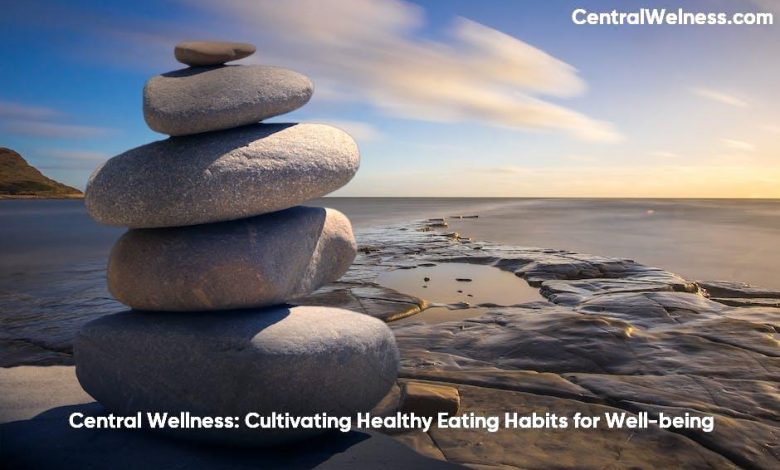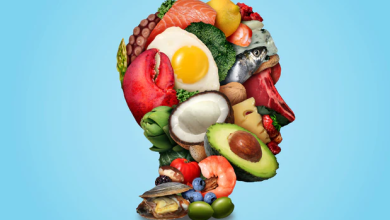Central Wellness: Cultivating Healthy Eating Habits for Well-being

Central Wellness: Cultivating Healthy Eating Habits for Well-being : Discovering Central Wellness, where healthy eating habits are nurtured for overall well-being. Fuel your body with nourishing foods and embrace a healthier lifestyle. #wellness #healthyhabits
Central Wellness is dedicated to promoting and cultivating healthy eating habits for overall well-being. In today’s fast-paced world, it has become increasingly important to prioritize our health and make conscious choices about the foods we consume. Healthy eating not only boosts our energy levels and improves our physical appearance, but also plays a crucial role in preventing chronic diseases and maintaining mental clarity. At Central Wellness, we believe that a balanced diet rich in nutrients is the foundation for a healthy lifestyle. Through our wide range of resources, including nutrition counseling, meal planning, and cooking classes, we aim to empower individuals to make informed decisions and develop sustainable eating habits. Join us on this journey towards better health and discover the transformative power of nourishing your body from the inside out.

The Importance of Healthy Eating for Overall Well-being
In today’s fast-paced world, maintaining a healthy lifestyle has become paramount. One crucial aspect of this is healthy eating. While it may seem like a mundane topic, the importance of healthy eating for overall well-being cannot be overstated.
Healthy eating is not just about consuming the right amount of calories or avoiding certain foods. It is a holistic approach towards nourishing our bodies with the right nutrients, vitamins, and minerals. The choices we make when it comes to our diet have a direct impact on our physical, mental, and emotional well-being.
When we fuel our bodies with nutritious foods, we provide the necessary building blocks for optimal health. A balanced diet, rich in fruits, vegetables, whole grains, lean proteins, and healthy fats, ensures that our body gets all the essential vitamins and minerals it needs to function properly. These nutrients not only boost our immune system but also support the growth and repair of our cells.
Moreover, healthy eating plays a crucial role in maintaining a healthy weight. Obesity has become a global epidemic, leading to numerous health complications such as heart disease, diabetes, and certain types of cancer. By making conscious choices to include nutritious foods in our diet, we can prevent these chronic conditions and improve our overall quality of life.
But the benefits of healthy eating go beyond just physical health. Studies have shown that a well-balanced diet can also have a positive impact on our mental and emotional well-being. Nutrients like omega-3 fatty acids, found in oily fish, have been linked to improved brain health and reducing the risk of depression. Similarly, certain plant-based foods, such as blueberries and dark chocolate, have been shown to enhance cognitive function and boost mood.
It is important to note that healthy eating is not about deprivation or strict dieting. It is about making informed choices and finding a balance that works for each individual. Enjoying occasional treats or indulging in your favorite comfort foods is perfectly acceptable as long as it is done in moderation and within the context of an overall nutritious diet.
In conclusion, healthy eating is not just a trend or a buzzword. It is an essential component of overall well-being. By nourishing our bodies with nutritious foods, we can improve our physical, mental, and emotional health. So let’s embrace the power of healthy eating and make it an integral part of our daily lives.
Tips on Developing and Maintaining a Balanced Diet
Eating a healthy and balanced diet is crucial for maintaining good physical and mental health. However, with the abundance of fast food and processed snacks available, it can be challenging to make nutritious choices. In this article, we will provide you with valuable tips to help you develop and maintain a balanced diet that supports your overall well-being.
1. Include a Variety of Foods
When it comes to a balanced diet, variety is key. Include a wide range of fruits, vegetables, whole grains, lean proteins, and healthy fats in your meals. This ensures that you receive all the essential nutrients your body needs.
2. Portion Control
Even if you’re eating healthy foods, consuming large portions can lead to weight gain. Be mindful of your portion sizes and listen to your body’s hunger and fullness cues. This will help you maintain a healthy weight and prevent overeating.
3. Limit Processed Foods
Processed foods are often high in added sugars, unhealthy fats, and sodium. These can have negative effects on your health, such as increasing the risk of obesity, heart disease, and diabetes. Opt for whole, unprocessed foods whenever possible.
4. Stay Hydrated
Drinking enough water is essential for maintaining a balanced diet. Water helps with digestion, nutrient absorption, and regulating body temperature. Aim to drink at least 8 cups of water per day, or more if you are physically active.
5. Plan and Prepare Meals
Eating a balanced diet requires planning and preparation. Take the time to create a weekly meal plan, and make a grocery list accordingly. This will help you avoid impulsive food choices and ensure that you have nutritious options available.
6. Avoid Skipping Meals
Skipping meals, especially breakfast, can lead to overeating later in the day. It can also negatively impact your energy levels and overall productivity. Aim to have regular meals and snacks throughout the day to keep your blood sugar levels stable.
7. Listen to Your Body
Everyone’s dietary needs are different, so it’s essential to listen to your body and adjust your diet accordingly. Pay attention to how certain foods make you feel and make choices that support your overall well-being.
8. Seek Professional Advice
If you’re unsure about how to develop and maintain a balanced diet, consider seeking advice from a registered dietitian or nutritionist. They can provide personalized guidance based on your specific needs and goals.
In conclusion, developing and maintaining a balanced diet is crucial for overall health and well-being. By including a variety of foods, practicing portion control, avoiding processed foods, staying hydrated, planning and preparing meals, avoiding skipping meals, listening to your body, and seeking professional advice when needed, you can effectively nourish your body and lead a healthier life.
How to Incorporate Nutrient-Rich Foods into Your Daily Routine
Eating a balanced diet that includes nutrient-rich foods is essential for maintaining optimal health and well-being. However, with our busy schedules and fast-paced lives, it can be challenging to incorporate these foods into our daily routine. In this article, we will explore some simple yet effective strategies to seamlessly add nutrient-rich foods to your diet.
1. Start your day with a nutritious breakfast
The old saying “breakfast is the most important meal of the day” holds true, as it sets the tone for the rest of your day. Opt for nutrient-dense options like whole grain cereal, Greek yogurt, and fresh fruits. These foods provide a good mix of carbohydrates, proteins, and essential vitamins.
2. Snack smartly
Avoid reaching for unhealthy snacks like chips or cookies when you feel hungry between meals. Instead, choose nutrient-packed alternatives such as nuts, seeds, or sliced fruits. These snacks will not only satisfy your hunger but also provide essential nutrients and keep your energy levels up.
3. Make veggies the star of your meals
When planning your lunch and dinner, aim to make vegetables the main component of your meals. Incorporate a variety of colorful veggies like spinach, broccoli, carrots, and bell peppers. They are packed with essential vitamins, minerals, and antioxidants that contribute to your overall health.
4. Opt for whole grains
Swap refined grains like white bread, pasta, and rice with whole grain alternatives. Whole grains provide more fiber, vitamins, and minerals. Include options such as quinoa, brown rice, and whole wheat bread in your meals to increase nutrient intake.
5. Include lean proteins
Proteins are the building blocks of our body and are vital for growth and repair. Replace high-fat proteins with lean options like skinless chicken breast, fish, tofu, or legumes. These sources of protein provide essential amino acids and are lower in saturated fats.
| Foods to Incorporate into Your Diet | Key Nutrients |
|---|---|
| Leafy greens (spinach, kale) | Iron, calcium, vitamins A, C, K |
| Berries (blueberries, strawberries) | Antioxidants, fiber, vitamins |
| Fatty fish (salmon, sardines) | Omega-3 fatty acids, vitamin D |
| Nuts and seeds (almonds, chia seeds) | Healthy fats, fiber, vitamins |
| Legumes (beans, lentils) | Protein, fiber, iron |
6. Hydrate adequately
Water is essential for maintaining overall health and helps transport nutrients in our body. Aim to drink enough water throughout the day to stay hydrated and support proper digestion and absorption of nutrients.
7. Plan and prepare your meals
Creating a weekly meal plan and prepping your meals in advance can help you stay on track with incorporating nutrient-rich foods. This way, you won’t be tempted to opt for unhealthy options when you’re pressed for time.
In conclusion, incorporating nutrient-rich foods into your daily routine is crucial for optimal health. By following these simple strategies and making mindful choices, you can provide your body with the essential nutrients it needs while enjoying delicious and satisfying meals.
Understanding the Relationship between Food and Mood
In today’s fast-paced world, many people are seeking ways to improve their mood and well-being. While exercise, sleep, and stress management are commonly discussed, the role of food in influencing our mood often goes unnoticed. However, studies have shown that the food we consume can have a significant impact on our emotional state. In this article, we will explore the relationship between food and mood and how you can make informed choices to support your mental well-being.
One key aspect to consider is the influence of nutrients on our brain chemistry. Our brain relies on a variety of nutrients to function optimally, including vitamins, minerals, amino acids, and omega-3 fatty acids. Deficiencies in these essential nutrients can contribute to mood disorders such as depression and anxiety. By consuming a balanced diet rich in fruits, vegetables, whole grains, and lean proteins, you can ensure that your brain receives the necessary nutrients to promote positive mental health.
Furthermore, certain foods have been found to have specific effects on our mood. For example, foods high in tryptophan, such as turkey, eggs, and tofu, can boost the production of serotonin, a neurotransmitter that regulates mood and promotes feelings of happiness and relaxation. Similarly, dark chocolate contains compounds that stimulate the release of endorphins, known as “feel-good” hormones. By incorporating these mood-boosting foods into your diet, you can naturally enhance your emotional well-being.
On the other hand, it is important to be aware of foods that can negatively impact our mood. Consuming excessive amounts of refined sugars and processed foods can lead to inflammation in the body, which has been linked to an increased risk of depression and anxiety. Additionally, caffeine and alcohol may provide temporary feelings of alertness or relaxation but can ultimately disrupt our sleep patterns and contribute to mood disturbances. Being mindful of your intake of these substances can help you maintain a more stable and positive mood.
- Eat a balanced diet rich in nutrients to support optimal brain function.
- Incorporate foods high in tryptophan and dark chocolate to boost serotonin and endorphin production.
- Avoid excessive consumption of refined sugars, processed foods, caffeine, and alcohol to prevent mood disturbances.
In conclusion, the relationship between food and mood should not be overlooked. By making conscious choices about what we eat, we can positively influence our mental well-being. Remember to prioritize a balanced diet, rich in nutrients that support brain health, and incorporate mood-boosting foods into your meals. At the same time, be mindful of foods that can have a detrimental effect on your mood. By adopting these practices, you can take control of your emotional well-being and lead a happier, healthier life.
Creating a Sustainable and Enjoyable Approach to Healthy Eating
In today’s fast-paced and hectic world, maintaining a healthy lifestyle has become more important than ever. With an overwhelming amount of information available, it can be challenging to find a sustainable and enjoyable approach to healthy eating. However, with the right strategies and mindset, you can achieve a balance between nourishing your body and enjoying the food you love.
One key aspect of adopting a sustainable and enjoyable approach to healthy eating is to focus on whole and unprocessed foods. Instead of relying on processed and packaged meals, aim to incorporate fresh fruits, vegetables, lean proteins, and whole grains into your diet. These nutrient-dense foods provide essential vitamins, minerals, and antioxidants that support your overall well-being.
Don’t be afraid to experiment with different flavors and cuisines. Healthy eating doesn’t have to be boring or tasteless. Incorporate herbs, spices, and condiments to add exciting flavors to your meals. By introducing variety into your diet, you can keep your taste buds satisfied while still providing your body with the essential nutrients it needs.
Another important aspect of a sustainable and enjoyable approach to healthy eating is mindful eating. In our busy lives, we often eat on the go or while distracted by screens. However, by practicing mindful eating, you can savor each bite and better listen to your body’s hunger and fullness cues. Put away your devices, sit down at a table, and truly enjoy your meals without any distractions. This not only helps you appreciate the flavors and textures of your food but also promotes better digestion.
| Sustainable and Enjoyable Healthy Eating Tips | |
|---|---|
| 1. Meal Prep: | Plan and prepare your meals in advance to ensure you have nutritious options readily available. |
| 2. Portion Control: | Pay attention to portion sizes to avoid overeating and promote a balanced diet. |
| 3. Hydration: | Stay hydrated by drinking plenty of water throughout the day, as it supports overall health and can help control cravings. |
| 4. Balanced Plate: | Fill your plate with a variety of colorful fruits, vegetables, whole grains, and lean proteins to ensure you’re getting a balanced meal. |
| 5. Mindful Snacking: | Choose healthy snacks like nuts, seeds, or cut-up fruits and vegetables, and be mindful of portion sizes. |
Remember, a sustainable and enjoyable approach to healthy eating is not about restriction or deprivation. It’s about nourishing your body, taking pleasure in your meals, and finding a long-term way of eating that works for you. Don’t be too hard on yourself if you indulge in a treat occasionally. Balance and moderation are key.
By following these tips and adopting a sustainable and enjoyable approach to healthy eating, you can enhance your overall well-being and maintain a healthy lifestyle in the long run. Start incorporating these strategies into your daily routine and enjoy the benefits of nourishing your body while still enjoying delicious meals.
For more information on healthy eating, you can visit (Healthy Eating Wikipedia). Remember, small changes can lead to significant results, so start your journey towards a sustainable and enjoyable approach to healthy eating today!
Frequently Asked Questions
Healthy eating provides numerous benefits, including improved physical health, increased energy levels, better weight management, enhanced mood and mental clarity, reduced risk of chronic diseases, and improved overall well-being.
A healthy eating plan consists of a balanced combination of fruits, vegetables, whole grains, lean proteins, and healthy fats. It also focuses on portion control and limiting the consumption of processed foods, sugary beverages, and high-sodium foods.
You can incorporate more fruits and vegetables into your diet by including them in every meal or snack. Try adding fruits to your breakfast cereal, salads, or smoothies. As for vegetables, you can include them in stir-fries, wraps, soups, or simply enjoy them as a side dish.
Yes, carbohydrates are an essential part of a healthy eating plan. However, it is important to choose complex carbohydrates like whole grains, legumes, and starchy vegetables, rather than refined carbohydrates like white bread and sugary snacks.
The recommended daily intake of water varies depending on factors such as age, weight, and activity level. As a general guideline, aim to drink at least 8 cups (64 ounces) of water per day to stay hydrated.
Yes, it is perfectly fine to indulge in occasional treats while following a healthy eating plan. The key is to practice moderation and make healthier choices most of the time. Opt for small portions and choose healthier versions of your favorite treats whenever possible.
While a well-balanced diet is the best way to obtain essential nutrients, some individuals may benefit from specific supplements. It is important to consult with a healthcare professional or registered dietitian to determine if you have any nutritional deficiencies and to discuss appropriate supplements if needed.
When dining out, you can stick to a healthy eating plan by choosing restaurants that offer healthier options, checking the menu beforehand to make healthier choices, opting for grilled or baked dishes instead of fried, asking for dressings and sauces on the side, and practicing portion control by sharing meals or packing leftovers.
Some tips for meal prepping on a healthy eating plan include planning your meals in advance, making a detailed grocery list, batch cooking and portioning meals for the week, using portion control containers or tools, refrigerating or freezing meals for later consumption, and incorporating a variety of nutritious ingredients in your prepped meals.
To maintain a healthy eating plan when faced with cravings, try distracting yourself with a healthy alternative, such as a piece of fruit or a handful of nuts. Engaging in physical activity or practicing mindfulness techniques can also help reduce cravings. It is important to be gentle with yourself and remember that occasional indulgences are a normal part of a balanced lifestyle.



